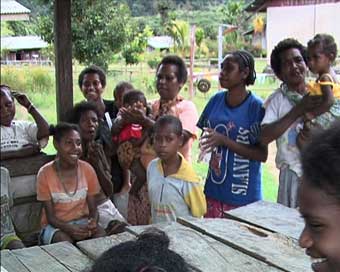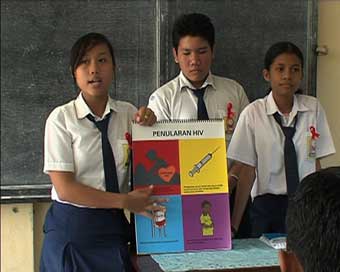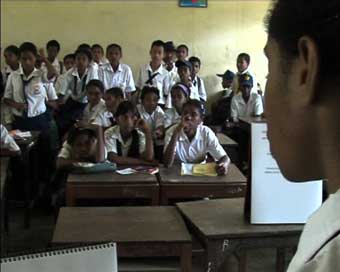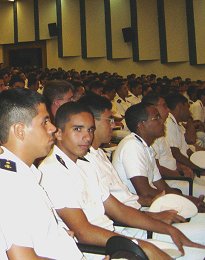This story was first published on
UNFPA.org
.JPG) A teenage girl and a young woman sit
A teenage girl and a young woman sit
together exploring the internet at the HIV
Shelter, “Guli Surkh”.
Credit: Warrick Page/PANO/UNFPA The United Nations Populations Fund (UNFPA) is supporting a unique set of media and training interventions in Tajikistan designed to raise awareness, reduce stigma and provide adolescents with the tools to improve their reproductive and sexual health.
Vulnerable youth
It is early morning at Dushanbe’s school number one. Sunlight is streaming through the dusty windows and the hallways are filled with a polyphony of young voices on their way to class.
Once they are settled in their seats, instructor Ferozia Nabieva, an obstetrician-gynaecologist, introduces the class and then launches into a lively discussion about reproductive health, contraception and HIV. Mindful of the strangers in their midst, the students are shy at first. But one by one the hands reach tentatively upward to an accompaniment of barely stifled giggles.
This grade nine class is mixed girls and boys, but others are segregated by gender. Privacy and comfort are critical when it comes to reaching out to young people, says Dr Nabieva. “In these classes they can share their concerns and get answers. Anywhere else they might experience shame, which is why we work with trainers who are also young and whom they trust.”
Some of the younger male trainers work primarily with boys and young men. Should students require more in-depth counselling, they are referred to the Dushanbe Reproductive Health Centre where a youth-friendly clinic deals solely with their young constituents.
UNFPA is negotiating with Ministry of Education to bring sexual and reproductive health programming into the classroom. The reasons behind this are mostly demographic. By 2015, 50% more young people will be attending the country’s schools. Informing young people of their reproductive health and rights – including the right to contraceptives – encourages responsibility and safer sexual behaviours that will decrease the risk of HIV infection.
Reaching out through radio and TV
 A TV monitor shows filming of "Healthy
A TV monitor shows filming of "Healthy
Generation"; a weekly-broadcast, youth-
issues based TV show.
Credit: Warrick Page/PANO/UNFPA In-school programmes can go only so far given the remote locations of many Tajik communities and the fact that so many lack access to electricity, school and services during the long, snowy winter months. To that end, UNFPA is also piloting a series of radio and TV shows that specifically focus on youth, reproductive health and HIV.
Boimorod Bobodjanov is the 31-year-old UNFPA youth projects manager. It was under his auspices that the organization began a series of TV pilots specifically for and about youth. After much cajoling, financial brinkmanship and concerted wooing aimed at the right quarters, UNFPA was able to secure four slots per month for a talk show about sexual and reproductive health that involves youth.
So successful is the show -- dubbed Safina -- that it will soon be on the popular seven o’clock Friday evening time slot.
The end result? A slick one-hour talk show that challenges traditional Tajik ways of perceiving issues such as gender rights and reproductive health, while maintaining respect for customs such as respect for elders and concern for the community. In order to get the show rolling, Mr. Bobodjanov had to act as fundraiser, producer, art director and writer. Although the government was initially opposed to the plan, the show has been airing for an entire year and the ratings are favourable. Today, the MTV-supported show is being branded under the umbrella of Y-PEER, a network of youth peer educators pioneered by UNFPA in 2000.
The hostess, 26-year-old Sitora Ashurova, is a former Y-PEER counsellor, who recalls with pleasure the very first time a person living with HIV spoke publicly about his status on national TV. “It was pretty special,” she says. “It was the first time the average Tajik could see that a person living with HIV could be anyone.”
Although programmers still have to skirt around specific terms such as condoms (referring to condoms as ‘protection’), Mr. Bobodjanov looks forward to the day when discussions will become even more open and that young people all over the country will know how to avoid HIV, where to get treatment if they do acquire it and that those living with the virus should be treated with the respect that they would accord any other person.
Because 42% of young people surveyed say they receive most of their information about HIV from TV, projects like Safina are a critical tool not only in the response to the disease itself, but the stigma that surrounds it.





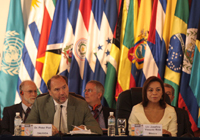
.JPG)



